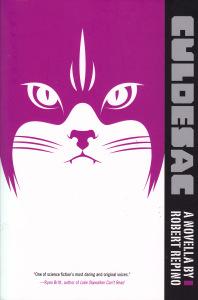 What does it mean to be human? The answer’s not as straightforward as it might seem. Reading Robert Repino’s Culdesac, that question came back to me time and again. This novella takes off from the story of Mort(e), about which I blogged shortly after its publication. Humans and animals that have acquired some human characteristics are at war. Most see those on the other side as inferior and that can make a human being reading the tale just a touch uncomfortable. We don’t have a great track record when it comes to dealing with non-human animals. We are all, after all, members of the same “kingdom.” Even down to the level of phylum and genus many of us show more general similarity than stark differences. Culdesac is a morphed bobcat who remembers all too well how humans treated animals before the war. And memory is a powerful thing.
What does it mean to be human? The answer’s not as straightforward as it might seem. Reading Robert Repino’s Culdesac, that question came back to me time and again. This novella takes off from the story of Mort(e), about which I blogged shortly after its publication. Humans and animals that have acquired some human characteristics are at war. Most see those on the other side as inferior and that can make a human being reading the tale just a touch uncomfortable. We don’t have a great track record when it comes to dealing with non-human animals. We are all, after all, members of the same “kingdom.” Even down to the level of phylum and genus many of us show more general similarity than stark differences. Culdesac is a morphed bobcat who remembers all too well how humans treated animals before the war. And memory is a powerful thing.
Repino has a way of sweeping the human reader (here the enemy) into the story and making those foundational questions ring as if struck with a hammer. What does it mean to be human? Granted, reading such provocative work under the current administration adds a layer of poignancy that wasn’t there when Mort(e) stood alone. In fact, it is a question that we have to ask just about every day when we see the headlines. There’s no leadership on this point coming from above. The idea of other humans as chattels has a long and disgraceful history. You can differentiate anyone on some basis or another: female or male or intersex, black or white or brown, rich or middle class or poor, large or average or small. Differences working together might be the very definition of culture. Culdesac shows what can happen when one sees only the distinguishing characteristics rather than the commonalities. It’s a parable.
Education, the one weapon in our arsenal that actually dismantles prejudice and intolerance, was one of the first targets our government sought to dismantle after 11/9. Indeed, the antipathy—if not downright hostility—toward education has been a characteristic of which Americans have long been unduly proud. We are not self-made, none of us. We all had our teachers. We all had our books. As we stand on the rim of this smoking crater and wonder how hatred toward one’s own species could be allowed to be nominated, let alone win, I believe the answer lies in our personal belief in education. We must all use the opportunities we have to educate. Get caught reading a book. Or helping a stranger. Or just being kind. As Culdesac emphasizes, wars are long-term events. Results won’t change after only one skirmish. If we all valued education—reading, learning—enough such aberrations as this could never happen. If you’re casting about for something to read that will make you ponder things at a most human level, I would suggest Culdesac.
